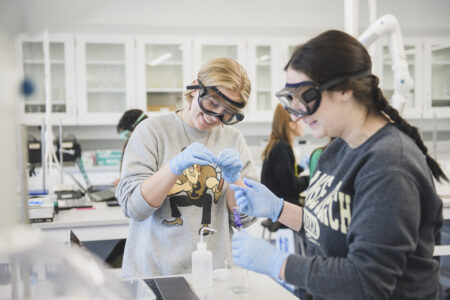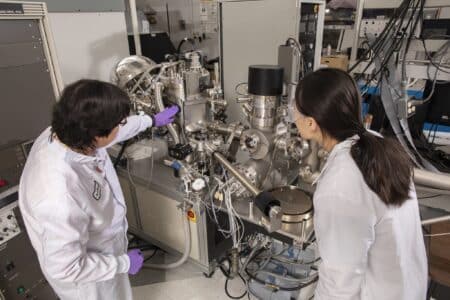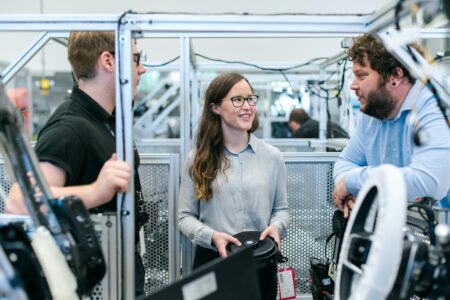
Emerging in the mid 20th century, ground-breaking discoveries such as nuclear fission and the harnessing of nuclear energy for electricity generation marked the dawn of the nuclear age. Since then, nuclear engineering has evolved into a diverse and dynamic field that intersects with physics, chemistry, material science and various other disciplines to significantly impact the world for the better.
Nuclear engineers play a crucial role in generating electricity, powering medical devices, and conducting scientific research. They design, build, and operate nuclear reactors, ensuring their safe and efficient operation while minimising environmental impact. The field also delves into radioactive waste management and developing advanced nuclear technologies, which promise clean and limitless energy.
Despite its potential benefits, nuclear engineering remains a complex field. Concerns about safety, proliferation, and radioactive waste disposal continue to be debated. However, with ongoing technological advancements and a growing emphasis on sustainability, nuclear energy will remain a significant player in the global energy mix, demanding the expertise of skilled and responsible nuclear engineers.
If you’re interested in working as a nuclear engineer, consider these three leading institutions:

Purdue University’s online nuclear engineering master’s program offers flexibility, choice of course work and skill advancement without career disruption. Source: Purdue University
Purdue University
Purdue University’s School of Nuclear Engineering established in 1960, has a rich history of excellence in research, education and service. Housed within the fourth-best graduate engineering program (U.S. News & World Report, 2024) and third-best online master’s in engineering program in the U.S. (U.S. News & World Report, 2024), the Purdue School of Nuclear Engineering is leading the charge in educating ethical nuclear engineers to provide technical expertise, cutting-edge research and engaging global partnerships.
Purdue, at the forefront of nuclear advancement and education, announced in 2022 the Purdue-Duke Energy Joint Small Modular Reactor (SMR) Feasibility Study. In collaboration with nearly three dozen world-renowned experts, Purdue and Duke Energy determined SMR and advanced reactor technology is a viable solution to achieving zero emissions at Purdue University’s West Lafayette Campus. Additionally, Purdue is home to Purdue University Reactor One (PUR-1), the first and only U.S. NRC facility licenced for fully digital instrumentation and control. This reactor, used for both research and educational purposes for students, is the domain for the first university research reactor digital-twin technology. This ground-breaking digital-twin is a virtual simulation of PUR-1, helping operators understand real reactor data and operations.
The school’s extensive network, diverse resources and cutting-edge technology provide substantial educational opportunities that are inclusive to online learners.
Purdue’s 100% online Master of Nuclear Engineering (MNE) program caters to bachelor’s degree graduates, seasoned professionals, engineers, technicians, and scientists seeking to elevate their expertise while maintaining their professional commitments and flexibility. Accredited by the Accreditation Board for Engineering and Technology (ABET), the online MNE mirrors the rigor of the on-campus counterpart, featuring esteemed faculty and industry-relevant coursework. Through a meticulously designed curriculum, students gain access to recorded lectures, weekly plans for assignments, projects, and exams, ensuring a seamless learning experience that accommodates their schedules.
As one of the nation’s oldest and most distinguished nuclear engineering programs, Purdue University remains committed to affordability and is proud to extend its frozen tuition rate for the 13th consecutive year through 2025-2026.
Discover more about the Purdue University Online Master of Nuclear Engineering and embark on a transformative journey towards becoming a leader in the field of nuclear engineering.

Nuclear Engineering was included in Italian engineering courses’ regulations in 1955-56, with the Polytechnic University of Milan becoming the first university in Italy to offer it as a subject in 1957. Source: Polytechnic University of Milan/Facebook
Polytechnic University of Milan
Polytechnic University of Milan offers a vibrant academic environment for students seeking excellence in science and technology. The School of Industrial and Information Engineering, the largest among the four schools, educates about 60% of the university’s student body. Here, cutting-edge research, renowned faculty, and state-of-the-art facilities create a space for learning and interaction with experts at the forefront of their fields.
For those seeking a specialised path in the nuclear field, the Laurea Magistrale (Master of Science) in Nuclear Engineering offers a comprehensive and in-depth education. This two-year postgraduate programme, taught entirely in English, has three tracks: Nuclear Plants, Nuclear Technologies, and Nuclear System Physics. Students delve into core subjects like radiation detection, reactor physics, and nuclear design, gaining a solid foundation in both theoretical and practical applications.
Beyond the classroom, you’ll benefit from experimental facilities, including nuclear safety labs, TRIGA research reactor, and Micro- and Nanostructured Materials science laboratories. This hands-on experience allows you to translate theoretical knowledge into practical know-how, preparing you for real-world challenges.Graduates are well-equipped for many career paths within the nuclear sector. They can find employment in industries involved in power plant design, operation, and decommissioning, as well as nuclear waste management and radiation source development.

The Centre for Nuclear Engineering (CNE) at Imperial College London coordinates nuclear energy research across faculties and with external partners. Source: Imperial College London
Imperial College London
Imperial College London, ranked first among Russell Group universities for research impact, has a long history in nuclear energy through its Centre for Nuclear Engineering (CNE). Established after World War II, the CNE has consistently contributed to advancements in this crucial field, domestically and internationally.
Beyond groundbreaking research, the CNE nurtures the next generation of nuclear experts. They offer innovative educational programmes at all levels, from undergraduate degrees to doctoral training centres. Notably, the CNE spearheads the prestigious six million pounds EPSRC Centre for Doctoral Training in Nuclear Energy Futures (NEF CDT) and the Imperial Cambridge Open CDT (ICO CDT), preparing students for leadership roles in the nuclear industry.
For those seeking a specialised education, the CNE offers three unique MEng programmes: Chemical with Nuclear Engineering, Materials with Nuclear Engineering, and Mechanical Engineering with Nuclear Engineering.
Take Materials with Nuclear Engineering for an example. This programme delves into how materials science revolutionises nuclear energy, encompassing reactor technology, radiation safety, and even fields like robotics and quantum computing. You’ll gain practical experience through laboratory tutorials, learning key techniques like electron microscopy and X-ray diffraction. The programme culminates in a substantial research project, allowing you to go deeper into your chosen area of expertise.
The CNE faculty comprises leading researchers from various departments within Imperial, along with industry experts like Dame Prof Sue Ion FRS. This diverse team ensures you receive a well-rounded education, combining academic rigour with insights from the field.
Imperial’s commitment to nuclear energy extends beyond its academic offerings. Through active engagement in outreach programmes like the NEF and ICO CDTs, students actively engage with the public, showcasing the potential and applications of nuclear science through interactive displays and demonstrations.
*Some of the institutions featured in this article are commercial partners of Study International










